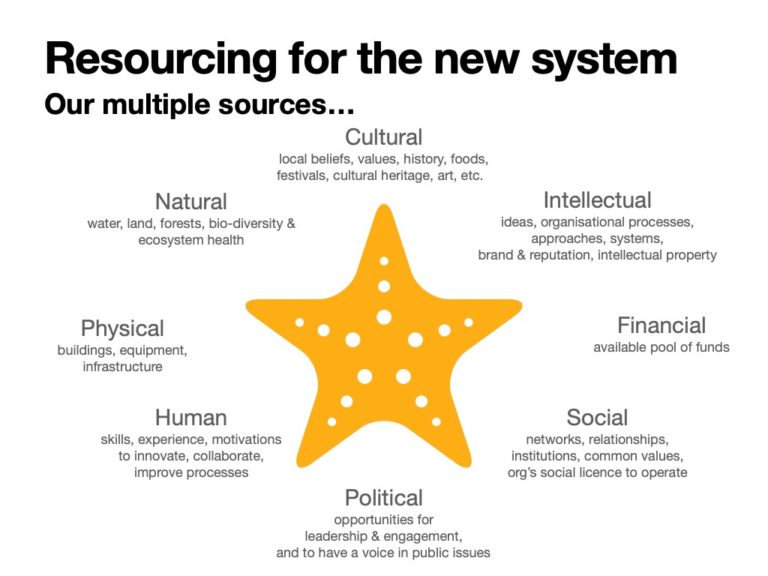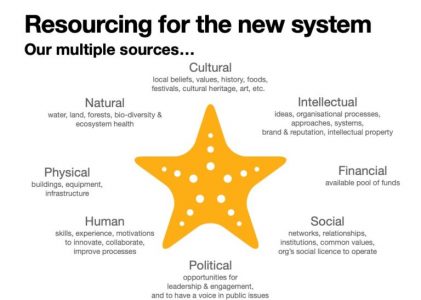This piece is part of a series of articles exploring the topic of civil society resourcing, and why this needs to be rethought – particularly in terms of placing more value on civil society’s “intangible” assets. See other posts: Rethinking civil society resourcing and Moving from the old to the new: Why it’s time to rethink civil society resourcing.

When we think capital or resources (I will use those terms inter-changeably) we often tend to automatically think money, finances, cash, funds. Yes, of course it is one kind of resource. But is it the only kind that makes things happen – to bring drinking water to a community, establish a network of health care posts, put together an urban neighbourhood’s waste management system?
Think about it – what really are the different kinds of resources that come to together to create something of value for a community, that changes their lives?
Every system – a village, a school, a self-help group, a local football team – tend to run on multiple forms of resources. AND various parts of each of those systems bring with them various kinds of resources for those systems to function. Individuals in the village or on a football team might have time, skill and experience – human and intellectual capital. Communities tend to have a common history, values, commitment, labour force, relationships and networks – social and cultural capital. Institutions, like the village committee, the district education department, the water and sanitation department have equipment, buildings, infrastructure AND their respective leadership mandate – social, political and physical capital. In any system, if you look, you will find there exists a richness of resources, which are very much part of the “resource pool” but are not always as visible to us.

Also, while looking at any system we might consider looking at it having both a requirement and sources of various kinds of capital.
So if we were to replace the image in our mind of one pot of money and instead look at it as a round bread with many slices what would our “resource bread” look like? Remember each slice makes that round bread round. The bread is incomplete without each of the slices. Just having one slice of financial capital will never be sufficient to create the change we need.
While creating a new system, we might consider thinking with a mind that lives in the new system. What I mean is, we may not succeed in building the system we want if we continue with our old system thinking, where, for instance, financial capital is the only resource. We might need to shift our imagination from the single pot of money to the round bread with many slices.
While thinking in new-system terms the round bread opens up to us the broader palette of resources that exist as part of any system.
The opportunity here with the new-system thinking is we can begin to influence and negotiate new ways of appreciation, collaboration, partnership with mutual respect, dignity, integrity and a redistribution of power – the real foundation of collaboration. It also might hold the key that brings us together (i.e. the current demand and the supply sides of the system) to collectively create integrated resource strategies – strategies that replace the single pot with the round bread, while making change happen.
In the process we might discover what each of us brings to the table and how we actually begin to negotiate our way forward with new, reimagined collective and cohesive thinking and action.
Having worked with development, climate and human rights globally over three decades, Tara is stimulated by living life as a systems change designer, serving diverse communities. She began her professional life as an architect and now combines her skills and experiences in exciting on-the-ground action, like #ShiftThePower.
A version of this article has been translated to Portuguese by the Brazil Philanthropy Network for Social Justice.
